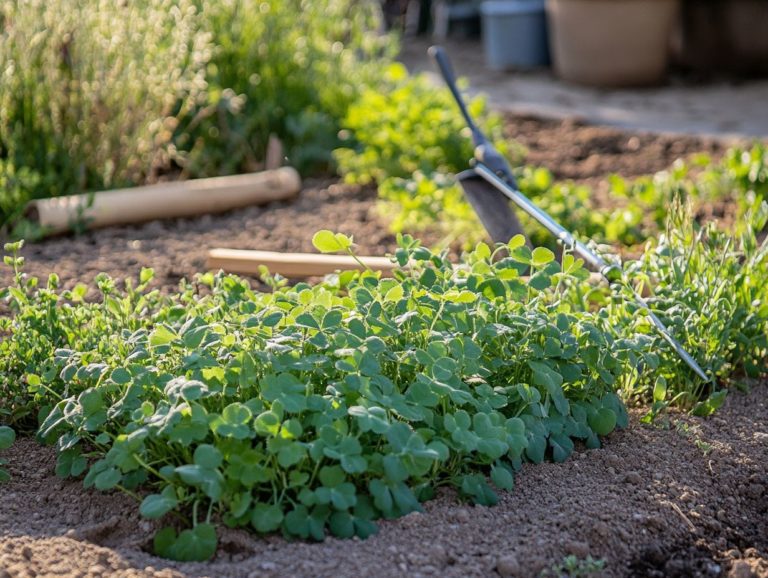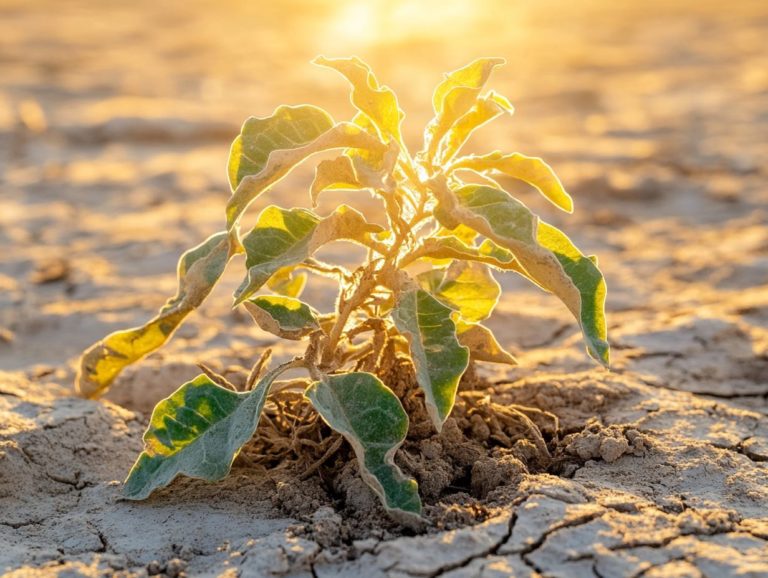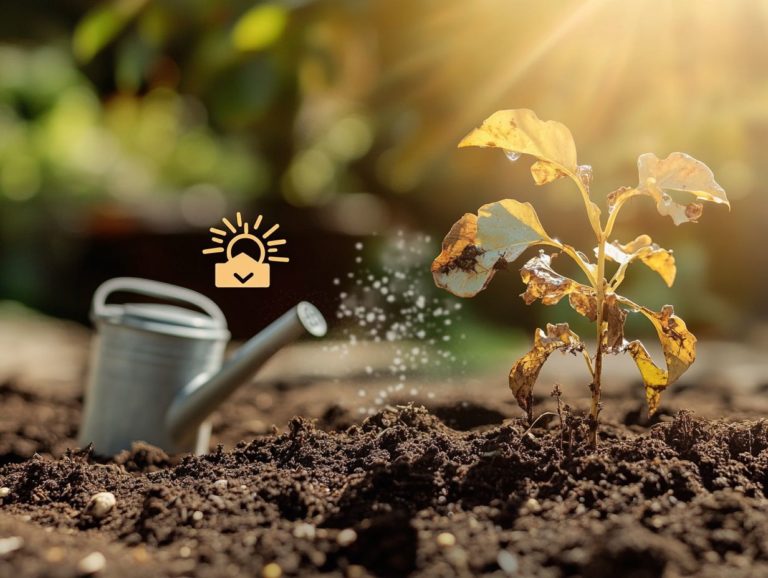The Importance of Soil pH Testing
Understanding soil pH is essential for you, whether you’re a gardener or a farmer, as it plays a pivotal role in cultivating healthy plants.
Soil pH directly affects nutrient availability, microbial activity (the activity of tiny organisms in the soil that help plants grow), and the overall growth of your plants. This article delves into the concept of soil pH and its significance, exploring how varying levels can impact plant health and the critical nature of soil testing.
You ll uncover practical methods to test and adjust your soil pH, ensuring your plants have the optimal conditions they need to thrive.
Dive in and discover how to manage your soil effectively for a bountiful harvest!
Contents
Key Takeaways:

- Understanding soil pH is crucial for gardeners and farmers, as it indicates the acidity or alkalinity of the soil and affects plant growth.
- Different pH levels can have significant impacts on plant health, nutrient availability, and soil microbial activity.
- Regular soil pH testing is essential for maintaining optimal soil conditions and ensuring healthy plant growth.
Understanding Soil pH
Understanding soil pH is essential for anyone with a passion for gardening, agriculture, or horticulture. It significantly influences the availability of nutrients for your plants and crops.
Soil pH, measured on a scale from 0 to 14, reveals the level of acidity or alkalinity in your soil. This affects everything from microbial activity to overall plant health. A neutral pH level is 7; anything below indicates acidity, while values above signify alkalinity.
By knowing your soil’s pH, you can make informed decisions about the right plants to choose and adjust soil properties as needed to optimize soil fertility and enhance your crop yields.
What is Soil pH?
Soil pH serves as a vital indicator, quantifying the concentration of hydrogen ions in the soil solution and revealing its acidity or alkalinity on a scale from 0 to 14.
Grasping this balance is essential for your gardening or farming endeavors. A lower pH (below 7) signals acidic conditions, while a higher pH (above 7) indicates alkalinity. These levels significantly influence nutrient availability, microbial activity, and overall plant health.
Using accurate tools, such as pH meters or soil testing kits, empowers you to assess soil conditions with confidence. When you optimize soil pH, you create an environment where plants can absorb essential nutrients more efficiently, promoting vigorous growth and boosting crop yields.
The Role of pH in Plant Growth
The pH level of your soil is critical for plant growth, as it directly impacts nutrient availability, microbial activity, and overall soil fertility. This, in turn, influences both crop yields and the health of your garden plants.
Different plants have unique pH preferences. For example, acid-loving plants like blueberries and rhododendrons flourish in lower pH conditions, while other crops may thrive in more neutral or alkaline soils.
Understanding the relationship between pH and plant health is essential for anyone looking to cultivate robust crops and create vibrant landscapes.
Effects of Different pH Levels on Plants
Different pH levels can significantly impact your plants’ health, influencing nutrient uptake and potentially leading to deficiencies that stunt growth and diminish crop yields.
If you’re dealing with acidic soils those with a pH lower than 6 you might find that essential nutrients like phosphorus and potassium become less accessible, resulting in stunted growth and pale foliage. On the flip side, if your soil is alkaline, typically with a pH above 7, you could encounter iron deficiency, which often shows up as yellowing in young leaves, a condition referred to as chlorosis. Chlorosis is when leaves turn yellow due to nutrient deficiencies.
The type of soil you have plays a crucial role in this dynamic. Sandy soils tend to leach nutrients quickly, while clay soils may retain them but can also hinder drainage. Therefore, maintaining optimal pH levels is essential for ensuring that your plants can access the vital nutrients they need for robust health and high productivity.
Start testing your soil pH today for improved plant health and yields!
Why Soil pH Testing is Important

Soil pH testing is crucial for a healthy garden and better crop yields. It provides insights into nutrient availability and soil health.
Understanding soil pH empowers you to choose the right soil amendments and fertilizers. This ensures your plants get the nutrients they need for optimal growth.
You can use DIY soil test kits or hire professional laboratory services. Knowing your soil’s pH can boost fertility and grow stronger plants.
Benefits of Knowing Your Soil pH
Knowing your soil pH offers many benefits. You can manage nutrients better, enhance crop yields, and improve garden health.
Soil pH affects how well plants absorb nutrients. A balanced pH fosters growth, helping crops thrive without stress from nutrient lack.
Keeping proper pH levels supports a healthier microbial environment. This benefits organisms that help make nutrients available.
Regular monitoring and adjustment of pH lead to a vibrant ecosystem in your garden. This reduces the need for chemical fertilizers and supports sustainable farming.
The result? Bountiful harvests and thriving plants for a vibrant agricultural landscape you can be proud of.
Methods for Testing Soil pH
There are effective ways to test soil pH. You can use simple DIY methods or send samples to a lab for precise professional analyses.
As a home gardener, you can use test kits from garden centers for quick assessments. For more accurate results, consider a lab analysis.
DIY vs Professional Testing
Both DIY methods and professional testing services have their own advantages. Choosing the right one can affect accuracy and convenience.
If you love DIY, testing at home is a cost-effective solution. With quick kits or simple materials, you can get instant results.
Professional labs provide rigorous testing. Though they may take longer and cost more, the detailed insights about nutrients and soil structure are invaluable.
Interpreting Soil pH Results
Knowing how to interpret soil pH results is key. It helps you make adjustments that improve plant health and soil fertility.
The readings reveal the acidity or alkalinity of your soil, affecting nutrient availability. Understanding this helps you create a thriving environment for your plants.
What Different pH Levels Mean for Your Plants

Ever wondered how pH levels impact your plants’ health? Understanding pH levels is crucial for optimal growth and preventing nutrient deficiencies.
Plants thrive within specific pH ranges, generally between 6.0 and 7.5. In this range, essential nutrients like nitrogen, phosphorus, and potassium are most accessible.
When pH strays too far into acidic or alkaline territory, problems arise. This includes obstructed nutrient uptake and potential toxicities.
For instance, overly acidic soil can increase the availability of aluminum and manganese, posing risks to your plants. On the flip side, alkaline soils may trap essential nutrients like iron, leading to deficiencies.
Regularly monitoring and adjusting soil pH is vital for maintaining plant health and optimizing yields.
Adjusting Soil pH
Adjusting soil pH is key for any gardener or farmer. This practice enhances nutrient availability and boosts crop yields.
You can raise or lower soil pH using various methods. Apply lime to increase alkalinity or use acidifying agents like sulfur to decrease pH levels.
By understanding your plants’ specific needs and assessing soil pH, you can make informed decisions. This will enhance your gardening or farming results.
Methods for Changing Soil pH
You can change soil pH through various methods. Apply lime to raise pH levels or use sulfur and specific fertilizers to lower them.
Understanding how these amendments work empowers you as a gardener or farmer. Lime, made primarily of calcium carbonate, neutralizes acidity and gradually increases pH, boosting nutrient availability.
Elemental sulfur transforms into sulfuric acid, quickly lowering pH levels. Many fertilizers contain ammonium-based compounds that further acidify the soil during breakdown.
Incorporating organic matter like compost or well-rotted manure can help maintain a balanced pH. This supports beneficial microbial activity, leading to stable soil conditions.
This comprehensive approach guides you toward effective soil management for plant health.
Maintaining Optimal Soil pH
Keeping soil pH at optimal levels is crucial for long-term health and fertility. This requires regular monitoring and management practices to maintain nutrient availability.
Consider strategies such as:
- Routinely testing soil pH,
- Incorporating organic matter to enhance nutrient retention, and
- Making necessary adjustments to pH levels through careful amendments.
Managing moisture and considering environmental factors significantly influences soil pH stability and the growth of your plants.
Tips for Long-Term Soil pH Management
Managing soil pH takes effort and requires regular testing along with the addition of organic matter. Understanding moisture retention practices is also essential for healthy plant growth.
To achieve this balance effectively, establish a testing schedule. Aim for soil pH tests at least once a year. Act now to make quick adjustments based on seasonal shifts. Incorporating organic amendments, like compost or well-rotted manure, enriches the soil’s nutrient profile and helps stabilize pH levels over time.
Moisture management is also crucial. Strategies such as mulching or implementing rainwater harvesting systems can significantly enhance water retention. When you combine these methods, they create an optimal environment that promotes robust soil health, ensuring your plants thrive throughout their various growth stages.
Frequently Asked Questions
Explore these common questions about soil pH to enhance your gardening knowledge.

What is the importance of soil pH testing?
Soil pH testing is important because it allows you to determine the acidity or alkalinity level of your soil, crucial for plant growth and overall soil health.
How does soil pH impact plant growth?
The pH level of soil affects the availability of essential nutrients for plants. Different plants thrive in varying pH levels, so knowing your soil pH helps you choose the right plants for your garden or adjust the pH level for optimal growth.
What are the consequences of not testing soil pH?
If you do not test your soil pH, you may inadvertently create an unsuitable environment for your plants. This can lead to stunted growth, nutrient deficiencies, and even plant death.
How often should soil pH testing be done?
Soil pH can change over time, so it is recommended to test it at least once a year. However, if you notice any changes in plant growth or if you are using fertilizers or amendments, it is best to test your soil pH more frequently.
Can I test my soil pH at home?
Yes, several at-home soil pH testing kits are available. However, for more accurate results, it is recommended to send a soil sample to a lab for professional testing.
How can I adjust my soil pH?
If your soil pH is too acidic, you can add lime to make it more alkaline. If it is too alkaline, you can add sulfur to make it more acidic. It is important to follow recommended amounts and methods for safe and effective adjustments.
Start your soil pH testing today to ensure a thriving garden!






